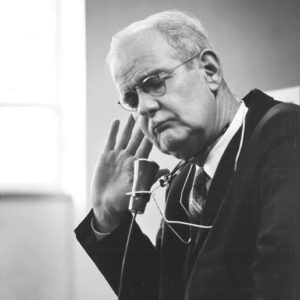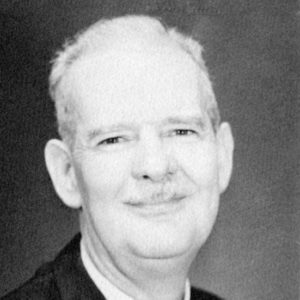calsfoundation@cals.org
Henry McMillan Alexander (1905–1969)
Henry McMillan Alexander brought the city manager plan to Arkansas and served as an adviser to many state agencies, cities, and counties. He was the founding chairman of the Department of Government at the University of Arkansas (UA) in Fayetteville (Washington County).
Henry Alexander came from a Southern aristocratic background in Jackson, Mississippi, where he was born on September 10, 1905. He had five brothers and one sister. When Alexander was eight, his father, Charlton Henry Alexander, died of a heart attack, just after President Woodrow Wilson nominated him for associate justice of the U.S. Supreme Court. He would have become the first Southerner appointed to the court after the Civil War.
When Alexander graduated from high school in 1922, his brothers, all graduates of Princeton and surrogate fathers to him, would not let him go to Princeton because they felt it had become too liberal. Being Presbyterians, they enrolled him at Davidson College in North Carolina, where he majored in political science.
Alexander graduated from Davidson in 1926 and was then allowed to go to Princeton for a master’s degree in political science, graduating in 1928. Afterward, he won a scholarship to the University of Missouri at Columbia to do his PhD work in political science. He graduated in 1934, writing his dissertation on “The City Manager Plan in Kansas City.” This was during the rule of political boss Tom Pendergast. Alexander’s conclusion was that the city manager plan could be good or bad, depending on how it was used.
After graduating from Missouri, Alexander accepted a job as associate professor of political science at Northwest Missouri State University in Maryville. There, he met Margaret Carrie Caldwell Baker, a widow, musician, and mother of Sarah Caldwell, who would later achieve fame as the artistic director of the Opera Company of Boston and the first woman to direct the Metropolitan Opera at Lincoln Center in New York. Alexander married Margaret Baker in 1938, and they had a son, George Baker Alexander.
In 1937, the University of Arkansas offered Alexander a job as professor of government, and he founded its Department of Government, which was renamed the Department of Political Science in 1966. He taught classes on the city manager plan, Arkansas and municipal government, state and local taxation, and public administration.
Alexander became the chief advocate of the city manager form of government during his time in Arkansas. He drafted the legislation to provide the choice of a city manager government to Arkansas towns. During his life, Fayetteville, De Queen (Sevier County), Camden (Ouachita County), Fort Smith (Sebastian County), Hope (Hempstead County), Little Rock (Pulaski County), and Jonesboro (Craighead County) adopted his model.
In 1953, Governor Francis Cherry appointed Alexander to the Arkansas History Commission (now called the Arkansas State Archives). In 1957, Alexander wrote a book, Government in Arkansas (Pioneer Press), with his final updated edition being published in 1963. He coauthored The City Manager Plan in Arkansas (University of Arkansas Press, 1966) with Kay Collett Goss, his graduate assistant. He wrote dozens of articles and served for many years as the secretary-treasurer of the Arkansas Historical Association (AHA).
Alexander had a heart attack in 1961 and battled throat cancer beginning in 1965. He died on May 18, 1969, after his second heart attack, and was buried in Fayetteville. He was honored in 1970 with a permanent membership in the AHA.
For additional information:
Vertical File A. Special Collections. University of Arkansas Libraries, Fayetteville, Arkansas.
Kay Collett Goss
Electronic Data Systems Corporation
 Civil War through Reconstruction, 1861 through 1874
Civil War through Reconstruction, 1861 through 1874 Politics and Government
Politics and Government World War II through the Faubus Era, 1941 through 1967
World War II through the Faubus Era, 1941 through 1967 Henry Alexander
Henry Alexander  Henry Alexander
Henry Alexander 




I was a student of Professor Alexander at the University of Arkansas in 1959-1961. He was my advisor for my MA in government, which I received in January 1961. Dr. Alexander was a classic. He always walked in the classroom, stopped in the doorway, head down, and drawled “pleasant day. ” Then he would flip his cigarette out the window, which was opened when we heard him walking down the hall. He loved to lecture about the “ward” or “boss” system and was most fond of Marlin Hawkins, Conway County sheriff for many years.